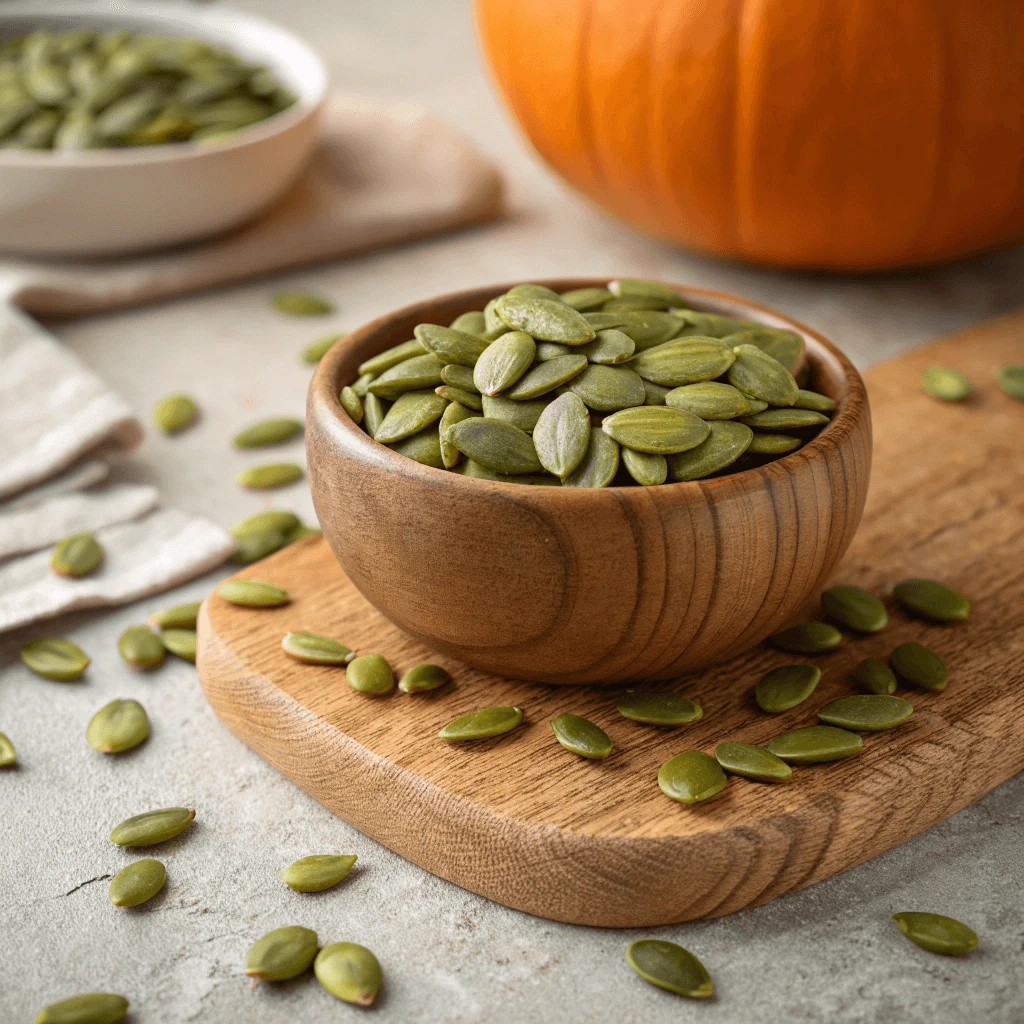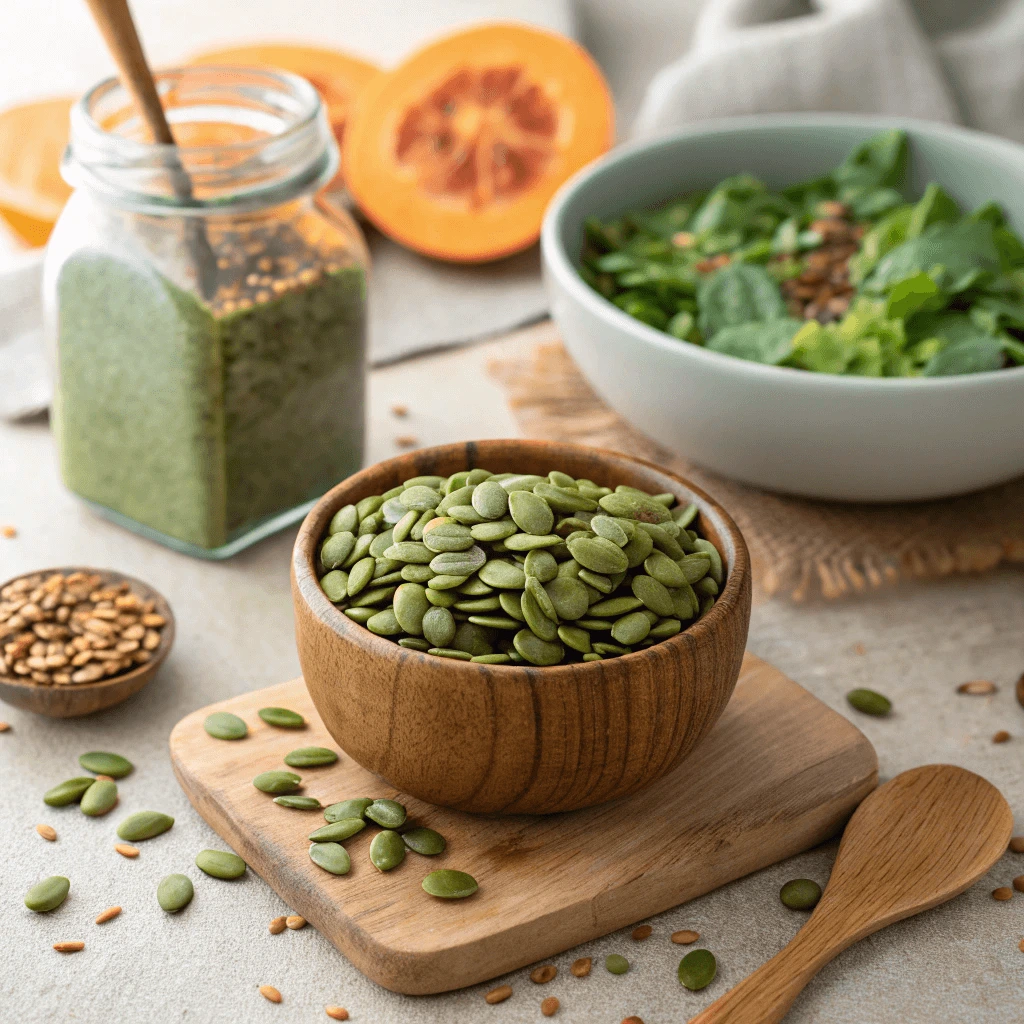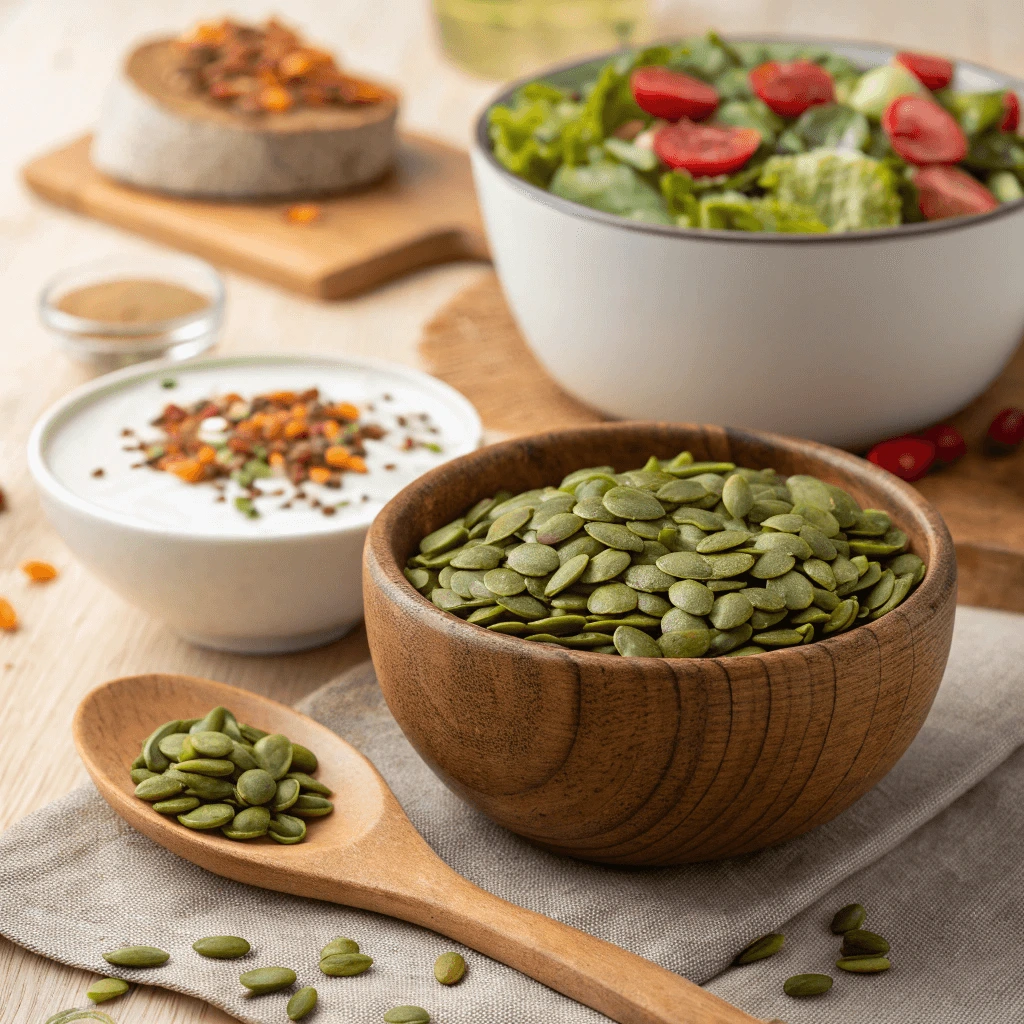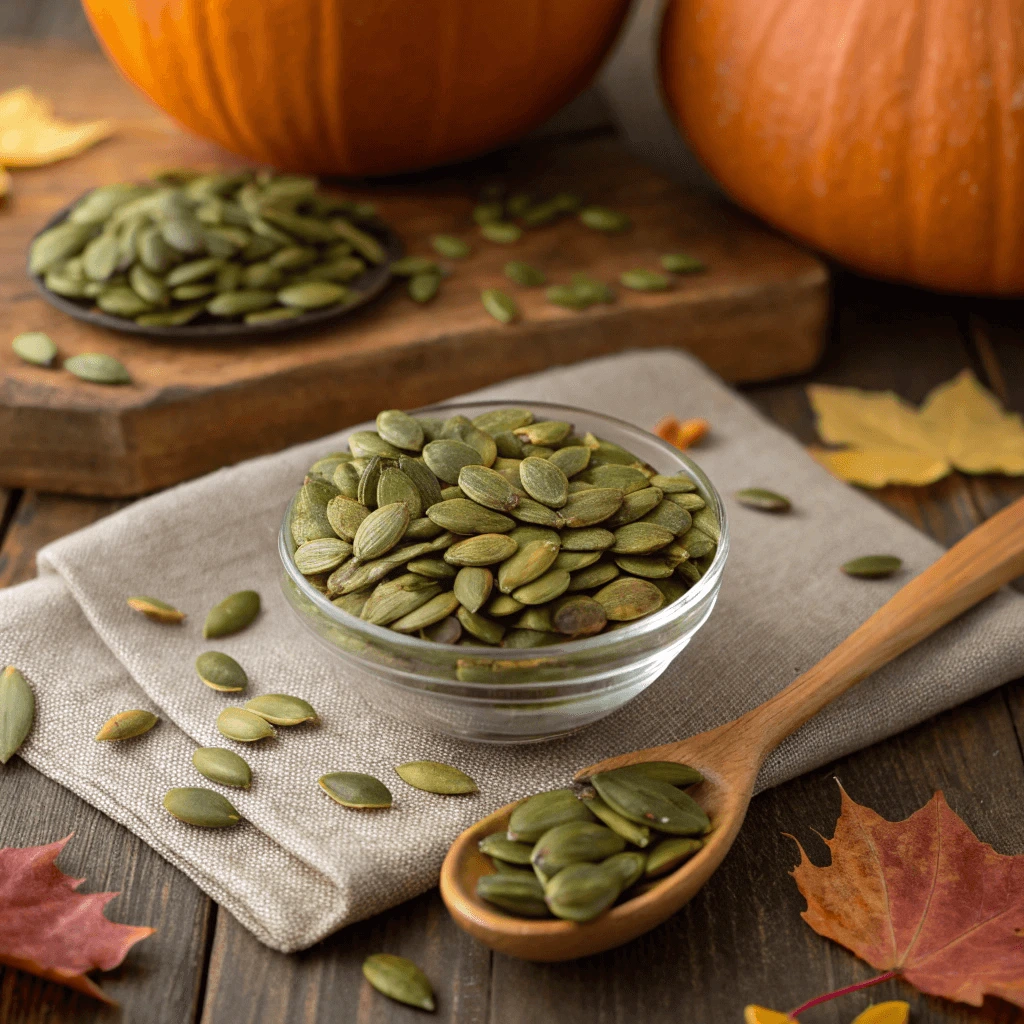Raw pumpkin seeds are packed with essential nutrients, making them a powerful addition to any diet. These tiny seeds offer a wealth of vitamins, minerals, and healthy fats, providing numerous health benefits. They are an excellent source of plant-based protein and contain magnesium, zinc, and antioxidants. Raw pumpkin seeds support heart health, boost immunity, and promote digestive well-being. Enjoy them as a quick snack, in smoothies, or sprinkled on salads. In this post, we’ll explore why raw pumpkin seeds deserve a place in your pantry and how they can improve your health.
What Are Raw Pumpkin Seeds?

Understanding Cucurbita pepo and Its Seeds
Raw pumpkin seeds come from the plant species Cucurbita pepo, which is part of the gourd family. This species includes pumpkins, squashes, and zucchinis. Cucurbita pepo is native to North America and has been grown for thousands of years for its fruits and seeds.
The Pumpkin Plant and Seed Development
The pumpkin grows as a vine producing large orange fruits. Inside these fruits, you’ll find seeds surrounded by fibrous pulp. As the pumpkin ripens, the seeds develop a protective outer shell that guards the nutritious kernel inside.
Farmers harvest pumpkins when fully mature, typically in the fall. After cutting open the pumpkin, the seeds are scooped out and cleaned from the pulp, ready to be eaten raw or roasted.
Anatomy of Pumpkin Seeds
Each pumpkin seed has two parts: a hard outer shell (or hull) and the edible kernel inside. The hull contains fiber, while the kernel is packed with protein, healthy fats, vitamins, and minerals. Some people eat the seeds with the shell on, while others remove it to enjoy the tender seed, called “pepitas.”
Why Raw Pumpkin Seeds Are a Superfood
Raw pumpkin seeds maintain all their natural nutrients because they don’t undergo roasting or heavy processing. They provide important minerals like magnesium and zinc, antioxidants, and plant-based protein. Eating raw pumpkin seeds supports heart health, immune function, and overall nutrition.
Differences Between Raw and Roasted Pumpkin Seeds
Raw and roasted pumpkin seeds vary in taste, texture, and nutrition. Knowing these differences can help you decide which one suits your needs best.
Flavor and Texture
Raw pumpkin seeds have a mild, slightly nutty flavor with a chewy texture. Roasting brings out a stronger, nuttier taste and makes the seeds crunchy. This change happens because heat removes moisture and enhances their aroma.
Nutritional Differences
Raw seeds keep all their natural enzymes and vitamins since they aren’t heated. Roasting can reduce some heat-sensitive nutrients like certain antioxidants and B vitamins. However, roasting also makes the seeds easier to digest by breaking down some compounds.
Storage and Shelf Life
Raw seeds hold more moisture, so they spoil faster if not stored properly. Roasted seeds last longer because roasting reduces moisture. Both should be kept in airtight containers to stay fresh.
How to Harvest and Prepare Raw Pumpkin Seeds
Harvesting and preparing raw pumpkin seeds at home is simple and rewarding. With a few steps, you can enjoy fresh, nutrient-packed seeds straight from the pumpkin.
Harvesting Pumpkin Seeds
Start by selecting a mature pumpkin, preferably during the fall harvest season. When the pumpkin feels heavy and has a deep orange color, it’s ready to be harvested. Cut open the pumpkin carefully and scoop out the seeds along with the surrounding pulp.
Cleaning the Seeds
Once you remove the seeds, separate them from the stringy pulp. Place the seeds in a colander and rinse them under cool running water. Rub the seeds gently between your fingers to remove any leftover pulp. Repeat rinsing until the seeds feel clean.
Drying the Seeds
After washing, spread the seeds evenly on a clean kitchen towel or paper towel. Pat them dry to remove excess water, then leave them to air dry completely. Drying may take a few hours or overnight, depending on humidity. Proper drying prevents mold growth and helps maintain freshness.
Preparing Seeds for Eating
You can eat pumpkin seeds raw once they’re fully dried. Some prefer to soak the seeds in water for several hours or overnight before consuming to improve digestibility. Others like to lightly roast the seeds to enhance flavor, but keep in mind roasting changes the raw nutritional profile.
Nutritional Profile of Raw Pumpkin Seeds

Key Vitamins and Minerals: Magnesium, Zinc, and Iron
Raw pumpkin seeds pack a powerful punch of essential vitamins and minerals that support various bodily functions. Among the most notable are magnesium, zinc, and iron. Let’s explore why these nutrients matter and how pumpkin seeds provide them.
Magnesium: The Vital Mineral for Muscle and Heart Health
Magnesium plays a crucial role in over 300 biochemical reactions in the body. It helps regulate muscle and nerve function, supports a healthy immune system, and keeps the heartbeat steady. Raw pumpkin seeds contain a rich amount of magnesium, making them a great natural source to help meet your daily needs.
Magnesium also contributes to bone strength and energy production. Including pumpkin seeds in your diet can improve these vital functions naturally.
Zinc: Boosting Immunity and Promoting Healing
Zinc is another important mineral found in raw pumpkin seeds. It supports immune health by helping the body fight off infections and heal wounds efficiently. Zinc also aids in DNA synthesis and cell growth.
Because the body doesn’t store zinc, it’s essential to consume enough through your diet. Raw pumpkin seeds offer a convenient and tasty way to boost your zinc intake, especially for people following plant-based diets.
Iron: Essential for Oxygen Transport and Energy
Iron is necessary for producing hemoglobin, the protein in red blood cells that carries oxygen throughout the body. Without enough iron, you might feel tired and weak.
Raw pumpkin seeds provide a plant-based source of iron, which can be especially beneficial for vegetarians and vegans. Pairing them with vitamin C-rich foods enhances iron absorption, making your meals even more nutritious.
Protein, Fiber, and Healthy Fats Content
Raw pumpkin seeds stand out as a nutrient-dense snack because they provide a balanced mix of protein, fiber, and healthy fats. These macronutrients play vital roles in maintaining your overall health and well-being.
Protein: Building Blocks for Your Body
Pumpkin seeds offer a significant amount of plant-based protein. Protein supports muscle growth, tissue repair, and the production of enzymes and hormones. Including raw pumpkin seeds in your diet can help you meet your daily protein needs, especially if you follow vegetarian or vegan diets.
Each ounce of raw pumpkin seeds contains about 7 grams of protein, making them an excellent source of this essential nutrient. Protein from pumpkin seeds provides all nine essential amino acids, which are necessary for various bodily functions.
Fiber: Promoting Digestive Health
Raw pumpkin seeds contain both soluble and insoluble fiber. Fiber aids digestion by promoting regular bowel movements and feeding beneficial gut bacteria. A healthy gut supports better nutrient absorption and strengthens your immune system.
Eating pumpkin seeds regularly can help prevent constipation and maintain digestive health. Their fiber content also contributes to a feeling of fullness, which can assist in weight management.
Healthy Fats: Supporting Heart and Brain Function
Raw pumpkin seeds are rich in healthy fats, primarily unsaturated fats like omega-3 and omega-6 fatty acids. These fats help reduce bad cholesterol levels and lower the risk of heart disease. They also play a crucial role in brain function and reducing inflammation.
The balance of healthy fats in pumpkin seeds supports overall cardiovascular health. Including these seeds as part of a balanced diet can improve your heart health and provide sustained energy.
Antioxidants and Phytosterols in Pumpkin Seeds
Raw pumpkin seeds contain valuable antioxidants and phytosterols that contribute to their status as a superfood. These compounds protect your body from damage and support long-term health.
Powerful Antioxidants for Cellular Protection
Pumpkin seeds deliver antioxidants such as vitamin E and carotenoids. These antioxidants neutralize harmful free radicals in the body, which can cause oxidative stress and damage cells. By fighting free radicals, antioxidants help reduce inflammation and lower the risk of chronic diseases like heart disease and cancer.
Consuming raw pumpkin seeds regularly helps your body maintain a healthy balance of antioxidants, supporting overall cellular health.
Phytosterols: Natural Compounds Supporting Heart Health
Phytosterols are plant-based compounds structurally similar to cholesterol. They work by blocking cholesterol absorption in the digestive system, which helps lower bad LDL cholesterol levels in your blood.
Raw pumpkin seeds provide a good amount of phytosterols, contributing to improved heart health and reduced risk of cardiovascular disease. Including these seeds in your diet can support healthy cholesterol levels naturally.
Additional Benefits of Antioxidants and Phytosterols
Besides protecting your heart, antioxidants and phytosterols in pumpkin seeds may support immune function and reduce inflammation throughout the body. These compounds also promote healthy skin and may slow down signs of aging by protecting skin cells from oxidative damage.
Health Benefits of Raw Pumpkin Seeds

Supporting Heart Health and Reducing Inflammation
Raw pumpkin seeds offer several benefits that contribute to heart health and help reduce inflammation in the body. Including these seeds in your diet can promote cardiovascular wellness and support overall health.
How Pumpkin Seeds Support Heart Health
Pumpkin seeds contain heart-healthy nutrients like magnesium, zinc, healthy fats, and phytosterols. Magnesium helps regulate blood pressure and maintain a steady heartbeat, while phytosterols work to lower LDL cholesterol levels, which are linked to heart disease.
Healthy fats in pumpkin seeds, especially unsaturated fats, help reduce bad cholesterol and increase good cholesterol. These fats also support healthy blood vessels and reduce the risk of plaque buildup. By eating raw pumpkin seeds regularly, you provide your heart with essential nutrients that promote optimal function.
Anti-Inflammatory Properties of Pumpkin Seeds
Chronic inflammation plays a role in many diseases, including heart disease, arthritis, and diabetes. Raw pumpkin seeds contain antioxidants and omega fatty acids that help combat inflammation.
Antioxidants like vitamin E neutralize free radicals, which cause oxidative stress and inflammation in the body. Omega-3 and omega-6 fatty acids found in pumpkin seeds also modulate inflammatory responses, reducing swelling and pain.
By reducing inflammation, pumpkin seeds may support joint health, improve circulation, and enhance immune function.
Incorporating Pumpkin Seeds for Heart and Inflammation Benefits
Adding raw pumpkin seeds to your daily diet is easy and delicious. Sprinkle them on salads, yogurt, or oatmeal, or enjoy them as a crunchy snack. Their nutrient profile supports heart health and helps manage inflammation, making them a valuable addition to a balanced diet.
Boosting Immune System with Nutrient-Dense Seeds
Raw pumpkin seeds offer a powerful combination of nutrients that help strengthen your immune system. Including these seeds in your diet can enhance your body’s natural defenses against illness.
Zinc: A Key Mineral for Immune Function
Pumpkin seeds provide a rich source of zinc, which plays a critical role in maintaining a healthy immune system. Zinc helps activate white blood cells that fight infections and supports wound healing. Because the body doesn’t store zinc, consuming foods rich in this mineral regularly is essential.
Raw pumpkin seeds make an excellent plant-based source of zinc, especially for those on vegetarian or vegan diets. Adding them to your meals can help ensure you get enough zinc to keep your immune defenses strong.
Antioxidants Protect Immune Cells
In addition to zinc, raw pumpkin seeds contain antioxidants such as vitamin E and carotenoids. These antioxidants protect immune cells from damage caused by harmful molecules called free radicals. By neutralizing free radicals, antioxidants reduce inflammation and help your immune system function efficiently.
Eating pumpkin seeds regularly supplies your body with these protective compounds, supporting overall immune health.
Other Nutrients Supporting Immunity
Raw pumpkin seeds also contain magnesium, iron, and healthy fats that contribute to immune system strength. Magnesium supports cellular functions and energy production, while iron helps transport oxygen to immune cells. Healthy fats improve the absorption of fat-soluble vitamins, which play roles in immune health.
Enhancing Bone and Muscle Health with Magnesium and Zinc
Raw pumpkin seeds supply essential minerals like magnesium and zinc, which play critical roles in maintaining strong bones and healthy muscles. Including these seeds in your diet supports physical strength and overall well-being.
Magnesium’s Role in Bone Strength
Magnesium helps regulate calcium levels in the body, a mineral vital for bone formation and maintenance. It also activates vitamin D, which aids calcium absorption in the intestines. Without enough magnesium, bones can become weak and brittle.
Raw pumpkin seeds provide a rich source of magnesium, helping you meet your daily requirements to support bone density and reduce the risk of osteoporosis. Regular consumption promotes stronger bones and improves skeletal health.
Zinc and Muscle Repair
Zinc contributes significantly to muscle repair and growth. It aids protein synthesis, which is necessary for rebuilding muscle tissue after exercise or injury. Zinc also supports immune function, helping your muscles recover more efficiently.
Including raw pumpkin seeds in your diet supplies your body with zinc to maintain muscle mass, especially important as you age or increase physical activity.
Combined Benefits for Physical Health
Magnesium and zinc together enhance muscle function by regulating nerve signals and muscle contractions. These minerals reduce muscle cramps and fatigue, enabling better exercise performance and quicker recovery.
Eating raw pumpkin seeds regularly provides a natural, nutrient-dense way to support both your bones and muscles, helping you stay active and healthy throughout life.
Delicious and Easy Raw Pumpkin Seeds Recipe
Ingredients for a Simple Spiced Raw Pumpkin Seeds Snack
Creating a delicious and healthy spiced snack with raw pumpkin seeds is quick and easy. By combining a few simple ingredients, you can transform plain seeds into a flavorful treat that’s perfect for snacking anytime.
Raw Pumpkin Seeds: The Base Ingredient
Start with high-quality raw pumpkin seeds as your base. These seeds offer a mild nutty flavor and crunchy texture, making them the perfect canvas for spices and seasonings. Choose organic, unsalted seeds to keep the snack as natural and nutritious as possible.
Spices for Flavor and Health Benefits
Add a blend of spices to enhance taste and introduce additional health benefits. Common choices include:
- Smoked Paprika: Adds a warm, smoky flavor with antioxidant properties.
- Ground Cumin: Offers an earthy taste and may aid digestion.
- Chili Powder or Cayenne Pepper: Brings heat and supports metabolism.
- Garlic Powder: Delivers savory notes and antibacterial benefits.
- Sea Salt: Balances flavors and enhances overall taste without overwhelming the seeds.
You can adjust the spice levels to your preference, creating either a mild or boldly flavored snack.
Optional Ingredients for Extra Nutrition
Consider adding a drizzle of olive oil or coconut oil. These healthy fats help the spices stick to the seeds and contribute to heart health. A squeeze of fresh lemon juice can brighten the flavors and add a hint of citrus.
For a touch of sweetness, sprinkle a small amount of cinnamon or a natural sweetener like maple syrup or honey. These ingredients add complexity and balance the savory spices.
Step-by-Step Preparation Guide
Preparing a spiced raw pumpkin seed snack at home is easy, quick, and highly customizable. Follow this straightforward guide to create a delicious and nutrient-rich snack in just a few minutes.
Step 1: Rinse and Dry the Pumpkin Seeds
If you’re using fresh pumpkin seeds from a pumpkin, start by rinsing them thoroughly under cool water to remove any pulp. Use your hands or a colander to separate the seeds from the stringy flesh. Once clean, pat the seeds dry using a clean kitchen towel or paper towel. Let them air dry for a few minutes to ensure they’re completely moisture-free—this helps the seasoning stick better.
If you’re using store-bought raw pumpkin seeds, you can skip this rinsing step and move straight to seasoning.
Step 2: Season the Seeds
Place the dried seeds in a mixing bowl. Add a small amount of olive oil or coconut oil—about 1 teaspoon per cup of seeds. This helps the spices adhere and enhances the texture. Sprinkle your chosen spices over the seeds. For example, try ½ teaspoon of smoked paprika, ¼ teaspoon of garlic powder, ¼ teaspoon of cumin, and a pinch of sea salt.
Toss the seeds thoroughly until they are evenly coated with the oil and spices.
Step 3: Prepare and Enjoy
If you prefer a raw snack, you can enjoy the seasoned seeds immediately. The flavors will be bold and fresh. However, if you want a slightly toasted flavor without fully roasting them, place the seeds in a dehydrator or a very low-temperature oven (no more than 170°F or 75°C) for 15–20 minutes to warm them gently without compromising their raw integrity.
Once ready, store the spiced pumpkin seeds in an airtight container. Keep them in a cool, dry place, and enjoy them within a week for the best taste and texture.
Tips for Flavor Variations and Serving Ideas
Raw pumpkin seeds are a blank canvas for creative flavors and easy-to-make snacks. With a few ingredients, you can give them sweet, savory, or spicy twists to suit your mood.
Flavor Variations to Try
- Sweet: Mix seeds with cinnamon, nutmeg, and a touch of maple syrup for a naturally sweet snack.
- Savory: Try garlic powder, rosemary, and sea salt for a classic, comforting taste.
- Spicy: Combine chili powder, paprika, and a squeeze of lime juice for a bold, zesty crunch.
You can adjust the seasonings to your taste or even combine styles for something unique.
Easy Serving Ideas
- Top your meals: Sprinkle seeds on salads, soups, or grain bowls for extra crunch and nutrition.
- Snack mix: Combine with dried fruits and nuts for a healthy trail mix.
- Breakfast boost: Add to yogurt, oatmeal, or smoothies for added texture and protein.
These small additions elevate your meals and make healthy eating more enjoyable.
Storage Tips
Store seasoned seeds in an airtight container at room temperature for up to a week. For longer freshness, refrigerate them. Pre-portioning into small containers can help with quick, on-the-go snacks.
Sample Content for the Recipe Section
Ingredients for a Simple Spiced Raw Pumpkin Seeds Snack
Creating a flavorful and healthy snack with raw pumpkin seeds only requires a handful of ingredients. By selecting a balanced mix of spices and natural seasonings, you can make a satisfying treat that’s easy to prepare and enjoyable to eat.
Basic Ingredients
Start with these core ingredients:
- Raw Pumpkin Seeds (Pepitas) – 1 cup
These are the main ingredient, rich in nutrients like magnesium, zinc, and healthy fats. Make sure they’re unsalted and shelled. - Olive Oil or Coconut Oil – 1 to 2 teaspoons
A small amount of healthy fat helps the spices adhere better and enhances the flavor. - Sea Salt – ¼ teaspoon
Brings out the natural taste of the seeds and balances stronger spices.
Flavorful Spice Options
You can adjust these spices based on your taste:
- Smoked Paprika – ½ teaspoon for a deep, smoky warmth
- Ground Cumin – ¼ teaspoon to add an earthy, savory layer
- Garlic Powder – ¼ teaspoon for bold, savory flavor
- Cayenne or Chili Powder – Optional, for those who like heat
These spices not only enhance flavor but also offer additional health benefits, such as antioxidants and anti-inflammatory compounds.
Optional Add-Ins
To customize your snack further, consider:
- Lemon or Lime Juice – A splash adds brightness and helps balance saltiness
- Maple Syrup or Honey – Just a touch for a sweet-and-spicy twist
- Cinnamon or Nutmeg – Ideal if you prefer warm, sweet flavors without adding sugar
With these ingredients, you can easily create a nutrient-dense snack that’s flavorful, versatile, and satisfying.
Step-by-Step Preparation Guide
Making a spiced raw pumpkin seed snack at home is simple, quick, and fun. Follow these clear steps to ensure your seeds turn out flavorful, crunchy, and ready to enjoy.
Step 1: Clean and Dry the Pumpkin Seeds
If you’re starting with seeds scooped from a fresh pumpkin, place them in a colander and rinse thoroughly under cold water. Use your hands to remove any clinging pulp. After cleaning, spread the seeds on a clean towel and pat them dry. Let them sit for about 10–15 minutes to air-dry fully.
For store-bought raw seeds, skip the rinsing and move straight to seasoning.
Step 2: Season the Seeds
Transfer the dry seeds into a mixing bowl. Drizzle them with 1–2 teaspoons of olive oil or melted coconut oil. Add your selected spices—such as smoked paprika, garlic powder, cumin, and a pinch of sea salt. Stir the mixture well until all seeds are evenly coated.
To keep the recipe raw, avoid roasting or baking. The oil and spice blend will provide enough flavor without cooking.
Step 3: Enjoy or Store the Snack
Once seasoned, you can eat the seeds right away for a fresh, flavorful crunch. If you prefer a warmer texture, warm them slightly in a dehydrator or in the oven at a low setting (under 170°F/75°C) for about 10–15 minutes, while still keeping them close to raw.
Store any leftovers in an airtight container. Keep the container in a cool, dry place and enjoy the seeds within 5–7 days for the best taste and texture.
Tips for Flavor Variations and Serving Ideas
Raw pumpkin seeds offer plenty of room for creativity in the kitchen. With a few simple ingredients, you can transform them into a flavorful snack that fits your taste.
Flavor Ideas to Try
- Sweet: Combine cinnamon, a touch of nutmeg, and maple syrup for a warm and naturally sweet mix.
- Savory: Use garlic powder, sea salt, and rosemary for a bold, herb-infused flavor.
- Spicy: Add chili powder, smoked paprika, and lime juice for a tangy, spicy twist.
Adjust seasonings based on your preferences—mix and match to keep things interesting.
Serving Suggestions
- Snack on them: Eat seasoned pumpkin seeds straight from the jar for a quick, healthy snack.
- Top your meals: Sprinkle them on salads, soups, or roasted vegetables for extra crunch and nutrients.
- Boost breakfast: Stir them into yogurt, oatmeal, or smoothie bowls to add protein and texture.
Store for Freshness
Place the seeds in an airtight container and store them at room temperature or in the fridge. They’ll stay fresh for up to a week and make a perfect grab-and-go option.
Conclusion
Raw pumpkin seeds are more than just a crunchy snack—they’re a true superfood loaded with essential nutrients like magnesium, zinc, iron, and healthy fats. Their impressive combination of protein, fiber, antioxidants, and phytosterols makes them a smart addition to any balanced diet. Whether you enjoy them seasoned, sprinkled on meals, or blended into snacks, raw pumpkin seeds offer both flavor and health benefits. Easy to prepare and endlessly versatile, these tiny seeds support heart health, immunity, and overall wellness with every bite.
